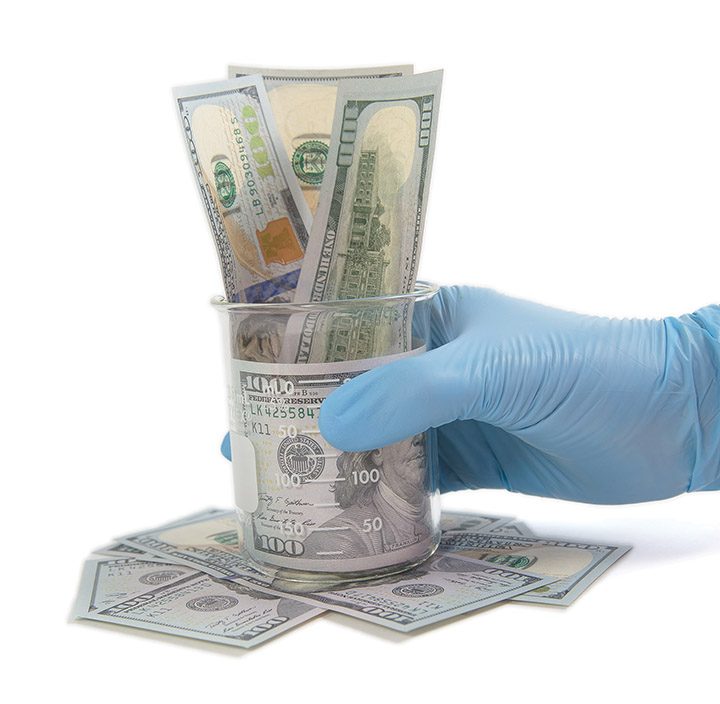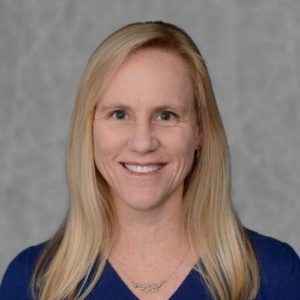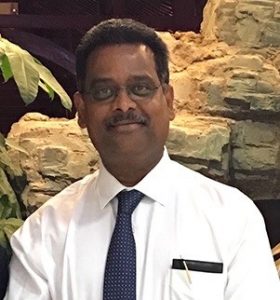
When the Rally for Medical Research took place in Washington, D.C., in September, among the voices were several Endocrine Society members. We spoke to Lindsey Trevino, PhD, T. Rajendra Kumar, PhD, Heather Patisaul, PhD, and Benson Akingbemi, PhD, about why they feel so strongly about becoming “endocrine advocates.”
In September, the Endocrine Society was a sponsor and participated in the Fifth Annual Rally for Medical Research in Washington, D.C. The Rally brought together over 400 researchers and patients from across the country to advocate for one important issue: Sustained, predictable funding increases for the National Institutes of Health (NIH). Participants took part in a Hill Day, where they met with their senators and representatives to share their stories and experiences and to highlight the importance of biomedical research in the U.S.
The Rally for Medical Research represents one way the Endocrine Society is active in advocating for endocrine issues that affect scientists, physicians, and patients. In addition to the Rally, the Society organizes Hill Days throughout the year and regularly engages policymakers through meetings, letters, phone calls, and social media. The Society’s most important and impactful contacts with Congress come from our members. Whether it’s coming all the way to Washington, D.C., for a Congressional meeting or sending a letter from the comfort of your own home, the Endocrine Society’s vibrant and growing advocacy program provides unique opportunities for members to make positive changes in their field.
We spoke to four Endocrine Society members who participated in this year’s Rally for Medical Research to get their perspectives on what it means to be an endocrine advocate.
Why do you think advocacy is important?
Treviño: Only those who treat patients with endocrine conditions and those who perform endocrine-related research have their fingers on the pulse of issues that are important for endocrine health policy. As such, we have a duty to engage policymakers as endocrine advocates.
Kumar: Advocacy allows you to get a broader perspective of what type of support is needed to propel biomedical research. It also lets you think how much your own work, if funded appropriately, can make a difference in healthcare.
When I first got started in science, “advocacy” was clearly a dirty word and there was a strong, negative perception that advocacy would taint the science or scientific integrity in general. With everything happening in Washington, and broad alarm about the erosion of public trust in science, that tide has clearly turned and more people are open to embracing advocacy efforts. – Heather Patisaul, PhD
Patisaul: As scientists and educators, we are obligated to educate and inform the public, including our legislative representatives. Science can’t advocate for itself – it takes dedicated people to explain and champion its value. Unfortunately, the value of science is often invisible, so it can be easy to take for granted. It’s up to us to remind people about the importance of science not only for discovery but also for making informed decisions in policy making and our everyday lives.
Akingbemi: It seemed useful to be able to provide information to congressmen and their staff on types of research that are undertaken by scientists and clinicians who receive NIH funding. Every advancement in the medical sciences, including the prevention, diagnosis and treatment of diseases, has their beginning in biomedical research. NIH funding is also critical to training and maintaining the pipeline of future scientists.
Why did you get involved in advocacy with the Endocrine Society?
Treviño: I got the opportunity to become involved with advocacy through my participation in the Future Leaders Advancing Research in Endocrinology (FLARE) program. As part of that program, I was an intern on the Research Affairs Core Committee where I learned about the Endocrine Society’s advocacy efforts. Throughout my career, I have benefited greatly from NIH-funded opportunities to enhance diversity in biomedical science, including the FLARE program. Funding to sustain these resources in particular, and endocrine research in general, has become a major issue that necessitates advocacy and I became passionate about becoming involved.
Kumar: When I served on the Endocrine Society’s Research Advisory Core Committee, I met Endocrine Society staff Mila Becker and Joseph Laakso, who were passionate about advocacy. I wanted to voice my opinion because I realized that describing my own research work in the context of major issues in endocrine research would make a huge impact. I am thankful to both Mila and Joe because they gave me this opportunity twice. I represented Kansas earlier, and this year, I represented the state of Colorado.
Every advancement in the medical sciences, including the prevention, diagnosis and treatment of diseases, has their beginning in biomedical research. NIH funding is also critical to training and maintaining the pipeline of future scientists. – Benson Akingbemi, PhD
Patisaul: My research focuses on chemicals that disrupt the endocrine system and, consequently, damage the developing brain. Through the Endocrine Society I have been able to explain what these compounds are to legislators and advocate for policy improvements that help protect public health. The Endocrine Society does an outstanding job of communicating with a wide range of stakeholders from policy makers to physicians and patients. People are hungry for a trusted source of scientific information and the Endocrine Society has established itself as a valued and influential contributor to that conversation.
Akingbemi: The first challenges that I was made aware of by my postdoctoral mentor were related to sourcing funds to maintain trainees and for laboratory supplies. With the decline in NIH funding over the last 10 years or so, the situation has only worsened. The scope of the negative effects of declining NIH funds can only be imagined when you consider that the NIH is the largest source of funding for biomedical research in the U.S.
What surprised you most about getting involved?
Treviño: I was surprised the most about how much each individual member can contribute to advocacy efforts, regardless of career stage. I am a relatively junior scientist, but I am still able to contribute by providing my perspective on issues facing early career endocrine researchers and endocrinologists.
Kumar: I was surprised to see more than 200 of my fellow scientists coming together and representing a common cause [at the Rally for Medical Research]. I thought that there would be only 10 to 12 members!
Patisaul: How eager my colleagues were to join in and how appreciated advocacy activities are to my scientific colleagues. When I first got started in science, “advocacy” was clearly a dirty word and there was a strong, negative perception that advocacy would taint the science or scientific integrity in general. With everything happening in Washington, and broad alarm about the erosion of public trust in science, that tide has clearly turned and more people are open to embracing advocacy efforts.
The easiest way to get involved is to answer the emails calling for involvement in Endocrine Society advocacy campaigns. The online system is very convenient, and it only takes a few minutes to personalize/sign the prepared statements to your representatives. As a Society, we have an opportunity to have a major impact on endocrine health policy, and the more people that participate in these campaigns, the better! – Lindsey Trevino, PhD
Akingbemi: I was surprised by the number and spectrum of visitors who were visiting with congressmen and legislative staff virtually around the clock. The experience reinforced to me the critical role that advocacy efforts play in not just maintaining current levels, but increasing NIH funding.
What is your most memorable experience on Capitol Hill?
Treviño: This year [at the Rally for Medical Research] I visited offices on Capitol Hill with patient advocates from various organizations. Their stories were so powerful and reminded me that the outcomes of advocacy efforts may mean life or death for some people. This is a sobering reality that emphasizes the importance of advocacy.
Kumar: Walking through underground tunnels from one building to another, and actually meeting a member of Congress from my state (Colorado) and explaining to him and his staff the need for increasing biomedical research funding!
Patisaul: My state is famous for the “bathroom bill” which barred transgender people from using the bathroom of their choice. On one of my trips to Capitol Hill, a North Carolina staffer quietly pulled me aside and asked me what “transgender” actually means. In that moment, I was given a rare opportunity to educate someone about a culturally charged topic. I don’t think I would have been asked if I wasn’t representing the Endocrine Society, which is regarded as a trusted source of biomedical information.
I think that every member should get away from their routine and volunteer to represent the Endocrine Society’s mission and visit Capitol Hill. It is an individual scientist’s conviction and moral responsibility. – Rajendra Kumar, PhD
Akingbemi: I enjoyed the opportunity to explain my research in very simple terms to legislative staff. They were knowledgeable in several issues that they learned from their personal experiences and/or previous interactions with members of the scientific community.
How can other members get involved?
Treviño: The easiest way to get involved is to answer the emails calling for involvement in Endocrine Society advocacy campaigns. The online system is very convenient, and it only takes a few minutes to personalize/sign the prepared statements to your representatives. As a Society, we have an opportunity to have a major impact on endocrine health policy, and the more people that participate in these campaigns, the better!
Kumar: I think that every member should get away from their routine and volunteer to represent the Endocrine Society’s mission and visit Capitol Hill. It is an individual scientist’s conviction and moral responsibility. Members may directly contact the Chief Policy Officer (Mila Becker at [email protected]) and express their intentions.
Patisaul: There are a myriad of ways. The Society routinely sends out emails asking people to sign on to letters or write their representatives. This is easily done through the Endocrine Society website by clicking on the links in the emails. Those letters make a difference. Advocacy also means talking to patients and other people to point them to reliable sources of scientific information.
Coming all the way to Washington, D.C., and talking with elected officials is only one way Endocrine Society members can get involved. For more information, go to www.endocrine.org/advocacy to find out how you can be an “endocrine advocate” too!
Harris is the Government and Public Affairs Specialist at the Endocrine Society. She was previously a peer-review specialist in the Society’s Publications Department.

 When I first got started in science, “advocacy” was clearly a dirty word and there was a strong, negative perception that advocacy would taint the science or scientific integrity in general. With everything happening in Washington, and broad alarm about the erosion of public trust in science, that tide has clearly turned and more people are open to embracing advocacy efforts. – Heather Patisaul, PhD
When I first got started in science, “advocacy” was clearly a dirty word and there was a strong, negative perception that advocacy would taint the science or scientific integrity in general. With everything happening in Washington, and broad alarm about the erosion of public trust in science, that tide has clearly turned and more people are open to embracing advocacy efforts. – Heather Patisaul, PhD Every advancement in the medical sciences, including the prevention, diagnosis and treatment of diseases, has their beginning in biomedical research. NIH funding is also critical to training and maintaining the pipeline of future scientists. – Benson Akingbemi, PhD
Every advancement in the medical sciences, including the prevention, diagnosis and treatment of diseases, has their beginning in biomedical research. NIH funding is also critical to training and maintaining the pipeline of future scientists. – Benson Akingbemi, PhD The easiest way to get involved is to answer the emails calling for involvement in Endocrine Society advocacy campaigns. The online system is very convenient, and it only takes a few minutes to personalize/sign the prepared statements to your representatives. As a Society, we have an opportunity to have a major impact on endocrine health policy, and the more people that participate in these campaigns, the better! – Lindsey Trevino, PhD
The easiest way to get involved is to answer the emails calling for involvement in Endocrine Society advocacy campaigns. The online system is very convenient, and it only takes a few minutes to personalize/sign the prepared statements to your representatives. As a Society, we have an opportunity to have a major impact on endocrine health policy, and the more people that participate in these campaigns, the better! – Lindsey Trevino, PhD I think that every member should get away from their routine and volunteer to represent the Endocrine Society’s mission and visit Capitol Hill. It is an individual scientist’s conviction and moral responsibility. – Rajendra Kumar, PhD
I think that every member should get away from their routine and volunteer to represent the Endocrine Society’s mission and visit Capitol Hill. It is an individual scientist’s conviction and moral responsibility. – Rajendra Kumar, PhD